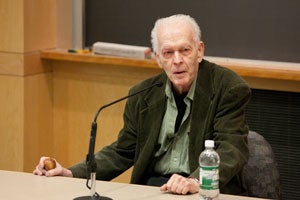Strategic planning and extensive knowledge are instrumental to staging successful nonviolent struggles, said Dr. Gene Sharp, the founder of the Albert Einstein Institution and author of several acclaimed books on nonviolent action during conflicts.
Speaking to students at a lecture sponsored by the Harvard Law School Advocates for Human Rights on March 9, the Nobel Peace Prize nominee discussed various elements of an effective nonviolent struggle and addressed the recent demonstrations in the Middle East in light of his research.
Sharp began his talk by recognizing how easy it is to feel helpless and powerless in a world rife with oppression, dictatorships, genocide and exploitation. Nevertheless, it is important to focus not on what cannot be done, but what is possible, he said, citing the 1943 Rosenstrasse protest in which German women demonstrated on the streets of Berlin, blocks away from Gestapo headquarters, until their Jewish husbands were released from concentration camps.
“The stereotypes of where this works and where this cannot work—forget that,” said Sharp. “Because we need to start not where it can’t work, but where does it work. And how far will we push that back.”
It is therefore important, he added, for those wishing to engage in nonviolent struggle to study historically successful examples and learn to improve upon them to make their own efforts more effective. They should look for the inherent weaknesses of the regime against which they plan to rebel, and focus the strengths of their civil resistance on those areas to accelerate its impact.
“What has happened already can happen again… not by improvising and (saying) ‘what do we feel like doing today?’” he said. “No, you need to start studying decades or years before.”
 Sharp, who has been called the “Machiavelli of nonviolence” and the “Clausewitz of nonviolent warfare,” went on to explain the three basic things people need to do before planning nonviolent action: understand their own circumstances and opponents, know the nature of nonviolent struggle in depth, and think strategically.
Sharp, who has been called the “Machiavelli of nonviolence” and the “Clausewitz of nonviolent warfare,” went on to explain the three basic things people need to do before planning nonviolent action: understand their own circumstances and opponents, know the nature of nonviolent struggle in depth, and think strategically.
Moving on to the recent nonviolent protests in the Middle East, Sharp said what surprised him about the Egyptian case was how the crowds claimed to have lost their fear—a trait Gandhi said is necessary for those wishing to do something important. The fact that over one million protestors managed to largely maintain nonviolent discipline was also noteworthy, he said.
Sharp offered a word of caution to the Obama administration about its involvement in the region: “stay out.”
“That’s the job for people in those countries. When the US goes in and tries to solve these crises, they’re going to mess things up… (because) their objectives are very different from the objectives of the people in those countries.”
Sharp is the Senior Scholar at the Albert Einstein Institution, a non-profit organization he founded in 1983 to study the use of strategic nonviolent struggles in conflicts around the world. He has a D.Phil. in political theory from Oxford University and held a research appointment at Harvard’s Center for International Affairs for nearly three decades. He is the author of The Politics of Nonviolent Action (1973) and most recently, Waging Nonviolent Struggle: Twentieth Century Practice and Twenty-First Century Potential (2005).
